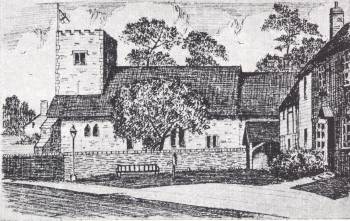|
The
Church
The history of this ancient church, the oldest
part of which dates back to 1040, is closely connected with the
priory founded by Henry I at Portchester in 1133. It was relocated
20 years later close to the church at Southwick. At the
Dissolution of the Monasteries in 1538 Henry VIII sold the
monastic estates to John Whyte and he was granted the office of
Lay Prior. To this day the Master of Southwick holds this office
and the church is known as the Lay Peculiar of Southwick being
exempt from diocesan jurisdiction.
Enter by the West Door, under the tower and the
17th century panelled gallery with its supporting moulded posts,
and the eye is caught by the blue painted barrel ceiling of the
nave. To the right is the impressive three decker pulpit of 1605
and behind it a large box pew originally for the ladies of
Southwick House with the Squire's Pew opposite on the north side.
Both are de luxe versions immaculately padded with blue cloth.
Until 1955 the nave was full of boxed pews but these have been
replaced by modern pews made by the estate workers, following the
ravages of death watch beetle.
The beautiful black altar table is Elizabethan and
behind is a large reredos containing an 18th century painting of a
dove and cherubs by an Italian artist. The altar rails are
Jacobean as are the massive brass altar candlesticks presented by
Richard Norton, Master of Southwick in the early 17th century.
High on the south side of the Sanctuary are three plaques. One
shows a Saracens Head, one the Norton Arms and the third a Golden
Lion.
The north side of the chancel is dominated by the
large tomb chest of John Whyte the first Lay Prior who died in
1567. On it are brasses of himself, his wife and their children.
Above is a canopy with heraldic shields and family crests. The
north panel is very weathered and it seems likely that the tomb
once stood in the Priory grounds.
This information and picture
come from the pages written by
John Symonds for the Waterlooville's On-Line Parish Magazine. Link
here.
|





